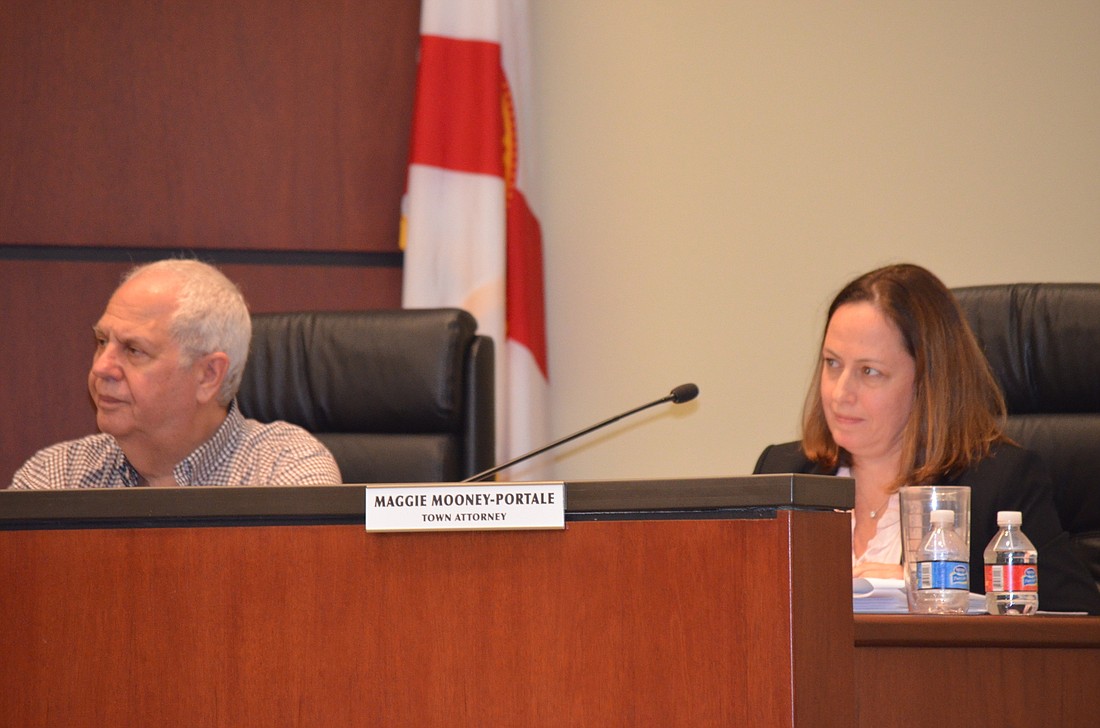- April 19, 2024
-
-
Loading

Loading

The town supports not-for-profit groups like the Kiwanis Club of Longboat Key and the Longboat Key Garden Club when they announce their events with signs on town rights-of-way.
But what if an extreme group like the Ku Klux Klan sought to plant signs in town rights-of-way? There would be nothing the town could do about it because of a recent Supreme Court ruling.
The Longboat Key Town Commission was forced to modify its sign ordinance to allow any group to apply for a sign permit while Town Attorney Maggie Mooney-Portale works to update the ordinance due to a recent U.S. Supreme Court ruling that requires sign code changes in municipalities throughout the country.
As Mooney-Portale waits for model sign code ordinances that reflect the Supreme Court’s decision to be approved, she gave the Town Commission two options to consider for groups that seek to place banner signs in town rights-of-way at the entrances to the Key.
“You either allow it all or prohibit it all,” Mooney-Portale said. “It’s an all-or-nothing approach.”
Town Manager Dave Bullock noted the sign code would still be in place, but sign content can’t be regulated.
“We would be blind to whatever any group wants to put on the sign,” Bullock said.
Mooney-Portale said it was important to make a decision before season ramps up and not-for-profit groups, such as the Kiwanis Club of Longboat Key and the Longboat Key Garden Club, start turning in applications for signs.
The commission struggled with the all-or-nothing approach, especially after Mooney-Portale said if all organizations are allowed to place a sign in the right-of-way, that doesn’t allow the town to turn down any group.
“We’re all comfortable with groups like Kiwanis and Rotary,” Mooney-Portale said. “But if a particularly offensive group like the KKK wants to advertise a beach event, we have to give them equal billing.”
Commissioner Irwin Pastor urged the commission to let all groups apply for a sign.
“We want to keep this in place for our not-for-profits until legal counsel gives us clarity,” Pastor said.
But Vice Mayor Terry Gans moved that the town prohibit anyone from applying for a sign in the rights-of-ways.
“There’s plenty of jackasses out there that like to push hot buttons,” Gans said. “If you open the door, you won’t be able to pick and choose.”
Gans’ motion received a 4-3 vote in support of the temporary sign ban.
But Commissioner Lynn Larson immediately called for a motion to allow anyone to place a sign in the rights-of-way.
“This is pretty ridiculous,” Larson said.
Larson’s plea gained traction.
“Whether we like it or not, this is America, and we have a right to free speech,” said Commissioner Phill Younger. “If we’re going to allow signs, we have to take a chance some undesirable elements will come from it. If we want to put the signs up, we have to accept the less desirable aspects.”
Pastor agreed.
“I’m ready to roll the dice on this one,” Pastor said.
Although Gans and others initially disagreed, all seven commissioners voted for a revised motion made by Larson that allows for the signs.
“The fairest way for the community to provide signs we all want to happen is to consider letting everyone do it in the interim,” said Commissioner Jack Daly.
The issue came about when the Supreme Court overturned the sign code of the town of Gilbert, Texas on First Amendment grounds in “Reed vs. the Town of Gilbert,” ruling that content-based regulations for signs are unconstitutional.
The ruling was made after more than 10 years of legal fighting between town officials and a church that sued the town based on free speech rights in regard to directional signs it posted every Sunday alerting parishioners to service times and other information.
“There’s a lot of uncertainty to what the ruling means,” Mooney-Portale said. “What it has effectively done is put all local governments on notice to take a careful look at their sign codes.”